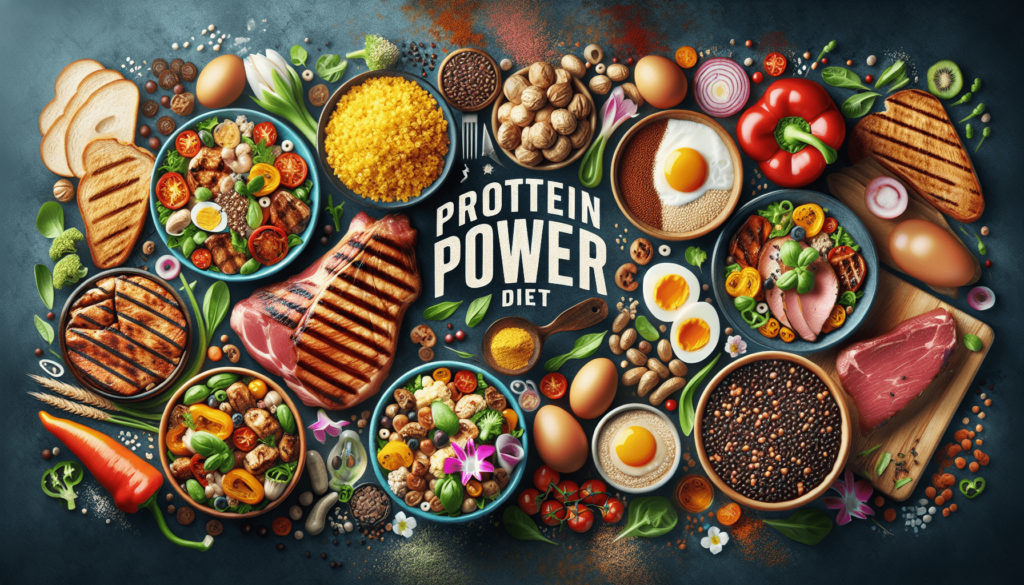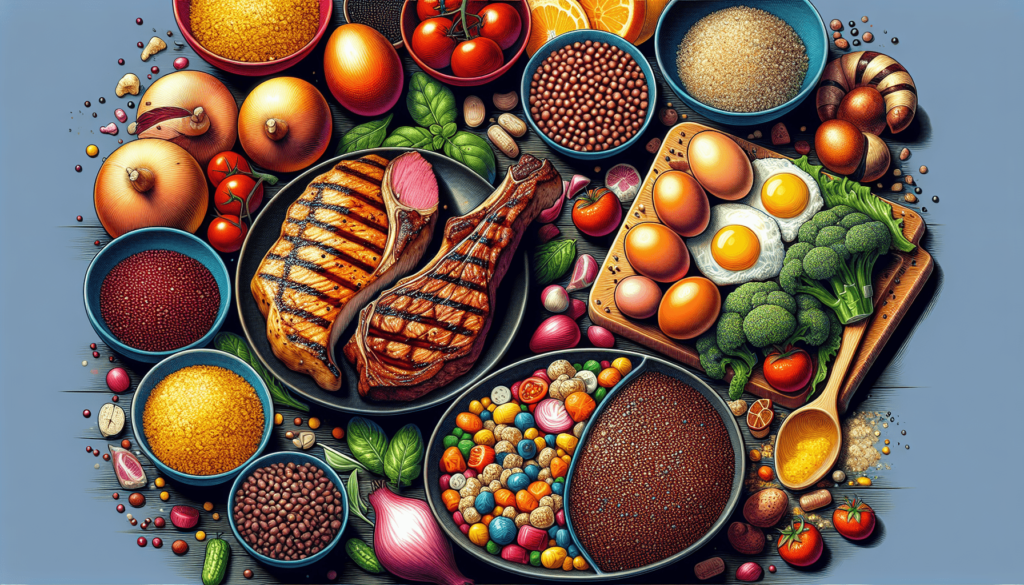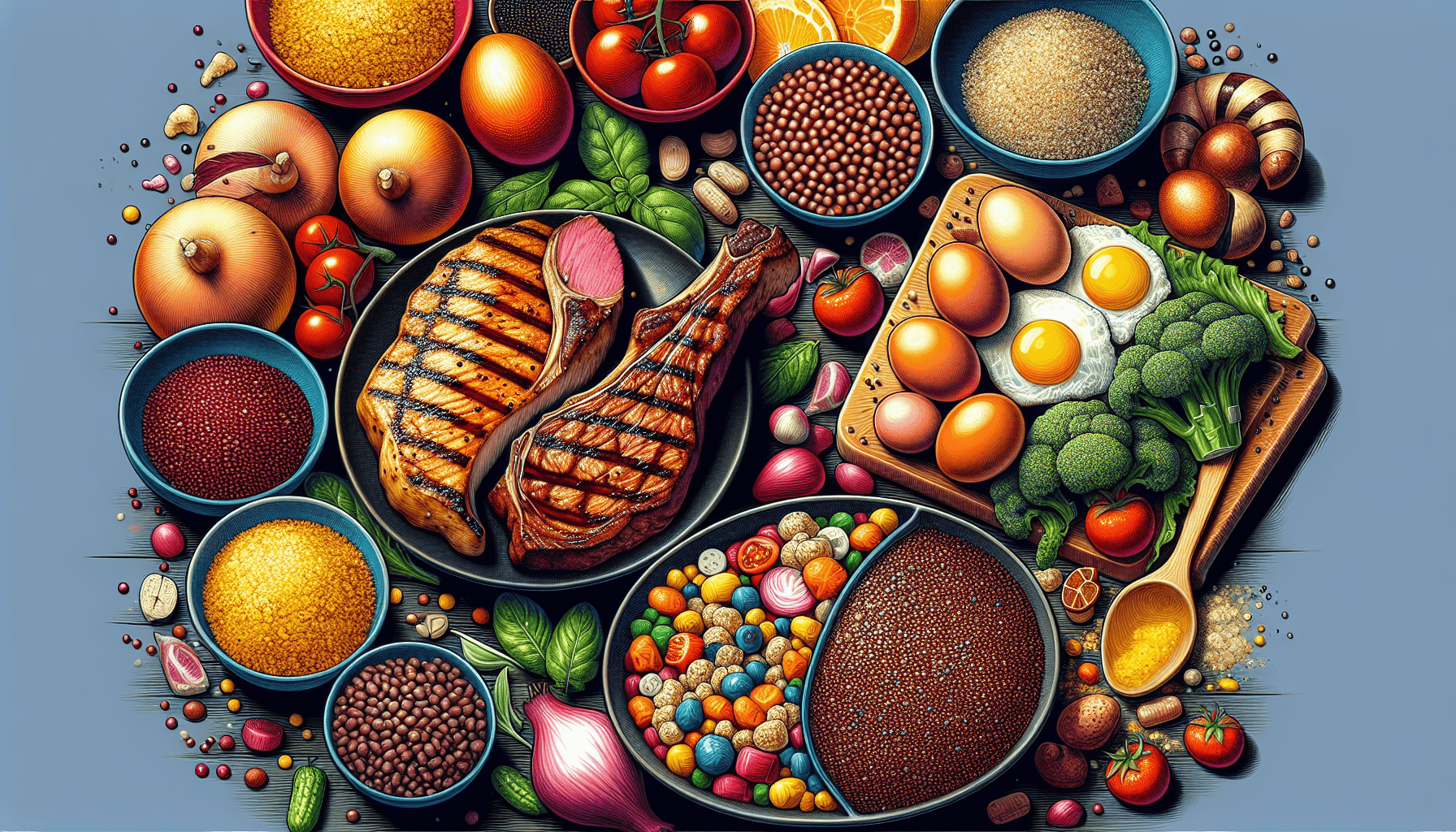Are you looking for a way to boost your energy levels and shed those extra pounds? Look no further than the Protein Power Diet. This guide will provide you with all the information you need to know about this popular diet trend. From the basics of protein intake to delicious meal ideas, we’ve got you covered. Say goodbye to hunger pangs and hello to a healthier, fitter you. Get ready to embark on a journey towards a protein-powered lifestyle that will leave you feeling satisfied, energized, and ready to take on the world. So, let’s dive in and discover the power of protein!
What is the Protein Power Diet?
The Protein Power Diet is a low-carbohydrate, high-protein diet that emphasizes the consumption of lean proteins and limits the intake of carbohydrates. It is designed to promote weight loss, increase muscle mass, and improve overall health.
Explanation of the diet
The Protein Power Diet is based on the principle that by reducing the consumption of carbohydrates and increasing the intake of protein, the body will enter a state of ketosis. Ketosis is a metabolic state in which the body burns stored fat for energy instead of carbohydrates. This can lead to weight loss and increased fat burning.
How it works
When you follow the Protein Power Diet, you are encouraged to consume a moderate amount of protein with each meal, along with plenty of non-starchy vegetables. This helps to keep you feeling full and satisfied while minimizing the intake of carbohydrates. By reducing your carbohydrate intake, your body will start to burn stored fat for fuel, resulting in weight loss.
Benefits of the diet
The Protein Power Diet has several potential benefits. First and foremost, it can aid in weight loss due to the reduction in carbohydrates and the increased intake of protein. Additionally, the higher protein content can help to preserve muscle mass during weight loss, leading to a more toned and defined physique. The diet may also help to stabilize blood sugar levels and reduce cravings for sugary and processed foods. Finally, the Protein Power Diet can provide a wide range of essential nutrients and promote overall health and well-being.
Foods Allowed on the Protein Power Diet
Lean meats and poultry
Lean meats and poultry are a staple of the Protein Power Diet. These include options such as chicken breast, turkey breast, lean cuts of beef, and pork tenderloin. These proteins are low in fat and high in protein, making them an ideal choice for this diet.
Fish and seafood
Fish and seafood are also excellent sources of protein that are allowed on the Protein Power Diet. Options such as salmon, tuna, shrimp, and cod are rich in omega-3 fatty acids and provide a good source of lean protein.
Eggs
Eggs are a versatile and affordable source of protein that can be incorporated into many different dishes. They are rich in essential vitamins and minerals and can be prepared in various ways, such as boiled, scrambled, or fried.
Dairy products
Dairy products such as Greek yogurt, cottage cheese, and cheese are allowed on the Protein Power Diet. These products provide a good source of protein while also delivering calcium and other important nutrients.
Nuts and seeds
Nuts and seeds are allowed on the Protein Power Diet in moderation due to their higher fat content. They provide a good source of protein, healthy fats, and fiber. Examples include almonds, walnuts, chia seeds, and flaxseeds.
Vegetables
Non-starchy vegetables are an essential part of the Protein Power Diet. These include leafy greens, broccoli, cauliflower, peppers, and asparagus. These vegetables are low in carbohydrates and provide important vitamins, minerals, and fiber.

Foods to Avoid on the Protein Power Diet
Processed meats
Processed meats should be avoided on the Protein Power Diet. These include items such as bacon, sausages, and deli meats. They often contain added sugars, unhealthy fats, and preservatives that can hinder weight loss and negatively impact your health.
Sugary foods and beverages
Sugary foods and beverages should be avoided on the Protein Power Diet. This includes items such as candy, soda, pastries, and sweetened yogurt. These foods are high in carbohydrates and can lead to blood sugar spikes and weight gain.
Starchy vegetables
Starchy vegetables like potatoes, corn, and peas should be limited on the Protein Power Diet. These vegetables are higher in carbohydrates and can hinder ketosis and weight loss.
Grains and cereals
Grains and cereals such as bread, pasta, rice, and cereal should be avoided on the Protein Power Diet. These foods are high in carbohydrates and can disrupt ketosis and slow down weight loss.
Legumes and beans
Legumes and beans, including chickpeas, lentils, and kidney beans, should be avoided on the Protein Power Diet. While they are a good source of protein, they are also high in carbohydrates.
High-fat dairy products
High-fat dairy products, such as whole milk, full-fat cheese, and ice cream, should be limited on the Protein Power Diet. While they do provide protein, they are also high in saturated fats and can hinder weight loss.
Meal Planning on the Protein Power Diet
Portion control
Portion control is an important aspect of the Protein Power Diet. It’s essential to eat the appropriate amount of protein, vegetables, and fats to ensure you are getting the necessary nutrients while promoting weight loss.
Balancing macronutrients
Balancing macronutrients is key to success on the Protein Power Diet. This means eating the right proportion of protein, carbohydrates, and fats. Aim for a higher proportion of protein, a moderate amount of healthy fats, and a smaller amount of carbohydrates.
Meal examples and recipes
Here are a few meal examples and recipes that you can enjoy on the Protein Power Diet:
- Grilled chicken breast with a side of steamed broccoli and a mixed green salad topped with olive oil and vinegar dressing.
- Baked salmon with roasted Brussels sprouts and cauliflower rice.
- Scrambled eggs with spinach, mushrooms, and feta cheese.
- Greek yogurt with berries and a sprinkle of nuts or seeds.
- Grilled shrimp with zucchini noodles and a garlic butter sauce.

Supplements for the Protein Power Diet
Protein powders
Protein powders can be a convenient way to increase your protein intake on the Protein Power Diet. They are available in various flavors and can be added to smoothies or used to make protein-rich desserts.
Branched-chain amino acids (BCAAs)
BCAAs are essential amino acids that are beneficial for muscle recovery and growth. They can be taken as a supplement to support your protein intake on the Protein Power Diet.
Omega-3 fatty acids
Omega-3 fatty acids are important for overall health and can be obtained through fish oil supplements or by consuming fatty fish such as salmon. They can help reduce inflammation and support heart health.
Exercise and the Protein Power Diet
Importance of exercise
Exercise is an important component of the Protein Power Diet. Regular physical activity can help increase muscle mass, improve cardiovascular health, and aid in weight loss. It also helps to enhance the effects of the diet and promote overall well-being.
Recommended exercise types
A combination of aerobic exercise and strength training is recommended on the Protein Power Diet. This can include activities such as walking, running, cycling, weightlifting, or participating in fitness classes. Aim for at least 150 minutes of moderate-intensity aerobic activity per week along with two or more days of strength training.
Timing of exercise
It is recommended to engage in exercise regularly while following the Protein Power Diet. You can choose to exercise at a time that works best for you, whether it’s in the morning, afternoon, or evening. Find a routine that fits your schedule and allows you to be consistent with your workouts.
Potential Side Effects of the Protein Power Diet
Ketosis
Entering a state of ketosis can have some temporary side effects, such as bad breath, fatigue, and headache. These symptoms are often referred to as the “keto flu” and typically subside after a few days as your body adjusts to using ketones for fuel.
Digestive issues
The Protein Power Diet may cause changes in bowel movements and digestive discomfort for some individuals. This can be attributed to the increase in protein intake and reduced fiber from carbohydrates. It is important to drink plenty of water and include fiber-rich vegetables in your diet to help alleviate these issues.
Nutrient deficiencies
Restricting certain food groups on the Protein Power Diet may lead to nutrient deficiencies if not properly planned. It is important to ensure you are still getting a wide range of essential vitamins and minerals. Consider adding a multivitamin or consulting with a registered dietitian to ensure you are meeting your nutritional needs.
Tips for Success on the Protein Power Diet
Stay hydrated
Drinking plenty of water is essential on the Protein Power Diet. It helps to flush out toxins, keep you feeling full, and prevent dehydration. Aim for at least 8 glasses of water per day.
Listen to your body
Pay attention to your body’s hunger and fullness cues. Eat when you’re hungry and stop when you’re satisfied. This will help prevent overeating and promote a healthy relationship with food.
Plan ahead
Planning your meals and snacks in advance can help you stay on track with the Protein Power Diet. This includes grocery shopping, meal prepping, and having healthy snacks readily available. By being prepared, you will be less likely to make impulsive food choices.
Seek support and accountability
Enlist the support of friends, family, or a support group while following the Protein Power Diet. Having someone to share your journey with and hold you accountable can greatly increase your chances of success. Consider joining online communities or finding a workout buddy to help you stay motivated.
FAQs about the Protein Power Diet
Can vegetarians follow the diet?
While the Protein Power Diet is primarily focused on animal-based protein sources, vegetarians can still follow the diet by incorporating plant-based proteins such as tofu, tempeh, legumes, and vegetarian protein powders. It may require some modifications and careful meal planning, but it is possible to follow the principles of the diet as a vegetarian.
Is the Protein Power Diet safe for long-term use?
The Protein Power Diet can be followed safely for a short period of time to achieve weight loss goals. However, long-term use of the diet may lead to nutrient deficiencies if a variety of foods is not consumed. It is important to transition to a balanced diet that includes a wide range of fruits, vegetables, whole grains, and lean proteins after reaching your weight loss goals.
Can I drink alcohol on the diet?
Alcohol should be consumed in moderation, if at all, on the Protein Power Diet. Alcoholic beverages tend to be high in carbohydrates and can hinder weight loss. If you choose to drink, opt for lower-carbohydrate options such as dry wines, light beers, or spirits mixed with sugar-free mixers. Be mindful of the calories and carbohydrates in alcoholic beverages and drink in moderation.
Is exercise required for success?
While exercise is not required for success on the Protein Power Diet, it is highly recommended. Regular physical activity not only aids in weight loss but also improves overall health and well-being. It can help boost metabolism, increase muscle mass, and improve cardiovascular fitness. Incorporating exercise into your routine can enhance the effects of the diet and lead to better results.
Conclusion
In summary, the Protein Power Diet is a low-carbohydrate, high-protein diet that can aid in weight loss, increase muscle mass, and improve overall health. By focusing on lean proteins, non-starchy vegetables, and healthy fats, you can achieve your weight loss goals while feeling satisfied and energized. Remember to listen to your body, stay hydrated, and seek support throughout your journey. With proper planning and dedication, the Protein Power Diet can be an effective and sustainable way to improve your health and well-being. Keep in mind that it is always important to consult with a healthcare professional before starting any new diet or exercise program. So, take the first step towards a healthier you and start incorporating the principles of the Protein Power Diet into your lifestyle today!

